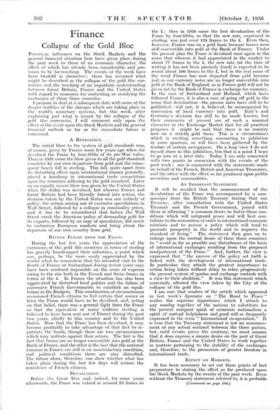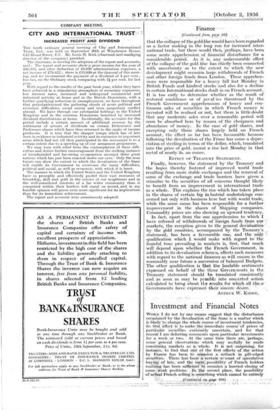Collapse of the Golcl Bloc
Finance
POLITICAL influences on the _ Stock Markets . and the general financial situation here have given .place during the past week to those of an economic Character; the effect of which has -already been., considerable and pro- mises to be far-reaching. The events of the week have been twofold in character ; there has occurred what might be described- as the collapse-of the gold bloc cur- rencies and the reaching of an important_ understanding between Great Britain, France and the United , States with regard to measures for controlling or steadying the exchanges of _those three Countries. I propose to denl.,at a subseqUent date with some of the deeper realities of the changes -which are taking plice in the world's - monetary systems, but this week; —after explaining just what is Meant by the collapse of the gold bloc currencies, I: dill comment only upon the effect of the event upon the Stock Markets and the general financial outlook so • fax as the immediate future is concerned.
A RETROSPECT.
The initial blow to the system of gold standards was, of course, given by France some few years ago when she devalued the Franc by four-fifths of its pre-War value. Then in 1931 came the blow given to all the gold Standard countries by our own departure from gold and the conse- quent heavy fall in sterling. This fall, quite apart from its disturbing effect upon international finance generally, placed a handicap in international trade competition upon the countries adhering to the gold standard. Later on an equally severe blow was given by the United States when the dollar was devalued, but whereas France and Great Britain had been literally forced into action, the decision taken by the United States was one entirely of policy, the action arising out of excessive speculations in Wall Street, followed by a collapse in commodity prices, and it has to be remembered that before the Wall Street crash the American policy of demanding gold for its exports, followed by an orgy of speculation, did much to embarrass European markets and bring about the departure of our own country from gold.
RECENT FLIGHT FROM THE FRANC.
During the last few years the appreciation of the currencies of the gold bloc countries in terms of sterling has gravely handicapped their industries, a point which can, perhaps, be the more easily appreciated by the reader when he remembers that his intended visit to the South of France or Switzerland during recent years may have been rendered impossible on the score of expense owing to the rise both in the French and Swiss francs in terms of the E. In France the situation has also been aggravated by disturbed local politics and the failure of successive French Governments to establish an equili- brium in the Budgets. This combination of circumstances occasioned French citizens to feel certain that sooner or later the Franc would haVe to be deValned, and, acting on that belief, there was a general flight from the-Tram so that the equivalent of many millions sterling is believed to have been sent out of FranCe during the past two years, chiefly to this country and to the United States. Now that the Franc has been devalued, it may become profitable to take advantage' of that fact to re- patriate the funds, though there are two circumstances which may militate against their return. The first is the fact that francs are no longer convertible into gold at the Bank of France, and the other is the fact that the national finances in France are still in an unsatisfactory condition, and political conditions there arc also disturbed. The future alone, therefore, can show whether what has taken place during the last few days will restore the confidence of French citizens.
DEVALUATION.
Before the Great War and, indeed, for some years afterwards, the Franc was valued at around 25 francs to the ; then in 1928 came the first devaluation of the Franc by four-fifths, so that the new rate, expressed in sterling, was just over 124 francs to the L. Even then, however, France was on a gold basis because francs were still convertible into gold at the Bank of France. Under the present plan the Franc is devalued once again in the sense that whereas it had appreciated in the market to about 77 francs to the £, the new rate (at the time of writing it has not been precisely fixed) is expected to be round about 100 francs to the £, but in the real sense of the word France has now departed from gold because just as our currency notes are no longer convertible into gold at the Bank of England, so in France gold will not be given out by the Bank of France in exchange for currency. In the case of Switzerland and Holland, which have followed France, it is also a case of going off gold in the sense that devaluation—the precise rates have still to be published—will not, it is believed, be accompanied by conversion of local currency into gold. -Italy's and Germany's decision has still to be made known, but their currencies at present are of such a nominal character -in the Exchange Market that for all practical purposes it Might be said that there is no country now on a strictly gold basis. This is a circumstance which is exciting something amounting to jubilation in some quarters, as will have been gathered by the readers of certain newspapers. On a long view I do not myself share in this jubilation, but that is a point I hope to go into at a later date. Today I am only concerned witli two points in connexion with the events of the past- week ; one is connected with the statements made on behalf of the French, British and American Treasuries, and the other with the effect so far produced upon public securities and commodities.
AN IMPORTANT STATEMENT.
It will be recalled that the announcement of the devaluation of the Franc was accompanied by a com- muniqué from the British Treasury stating that our Treasury, after consultation with the United States Treasury and the French Government, joined with them in affirming " a common desire to foster those con- ditions which will safeguard peace and will best con- tribute to the restoration of order in international economic relations and to pursue a policy which will tend to promote prosperity in the world and to improve the standard of living." The statement then goes on to enlarge upon the mutual desire of these three countries to " avoid as far as possible any disturbance of the basis of international exchanges resulting from -the -proposed readjustment of the Franc." And, further, the view is expressed that " the success of the policy set forth is linked with the development of international trade. In particular, they attach the greatest importance to action being taken without delay to relax progressively the present system of quotas and exchange controls with a view to their abolition." It was this statement which materially affected the view taken by the City of the collapse of the gold bloc.
I am sure that readers of the article which appeared in last week's _ Spectator on " The Road to Peace " realise the supreme importance which I attach to any comffig together " of the nations to substitute for the preSent rampant "spirit of economic nationalism a spirit of-mutual helpfpiness and good will so frequently expressed in the term " International co-operation." It is true that the Treasury statement is not an announce- ment of any actual contract between the three parties, but, until events prove the contrary, we must assume that it does express a sincere desire on the part of Great Britain, France and the United States to work together in matters pertaining to the stability of the exchanges and, therefore, to the promotion of greater freedom in international trade.
EFFECT ON MARKETS.
It has been necessary to set out these points of fact preparatory to stating the effect so far produced upon the Stock Markets by the events of the past week. Even without the Treasury statement referred to, it is probable (Continued on page 564.)
Finance
(Continued from page .50 that the collapse of the goldIge, wouldhav e, been regarded as a factor making in the long run for increased inter- national trade, but' there Would then, 'p'erliaps, have been someacute apprehension,:of financial disturbance for a considerable periOd. As it is, any unfavourable effect of the collapse of the gold bloc has chiefly been connected with uncertainty as to the extent .to which the new deVelopment might occasion large,withdrawaLs of French and other foreign funds from London. These apprehen- sions were responsible for a heavy fall last Monday in British Funds and kindred stocks and also for a decline in certain Intern'ational stocks dealt in on French account. . It is too early to determine whether as the result of restored confidence or of per al les threatened by the French Government apprehensions of heavy and con- tinuous sales of securities in Which French money is invested will be realised or not, but there is little doubt that any moderate sales over a reasonable period will soon be absorbed here by reason of the cheapness and abundance of 'money. In the case of gold shares, and excepting only those shares largely held on French account, the effect so far has been favourable because following the devaluation of the Franc has come a depre- ciation of sterling in terms of the dollar, which, translated into the price of gold, meant a rise last Monday in that metal of nearly 3s. an ounce.
EFFECT OF TREASURY STATEMENT.
Finally, however, the statement by the Treasury and the hopes thereby fostered of improved world trade resulting from more stable exchanges and the removal of some of the exchange and trade barriers have given a stimulus to the securities of all concerns thought likely to benefit from an improvement in international trade as a .whole._ This explains the rise which has taken place in the shares of certain big iniustrial undertakings con- cerned not only with business here but with world trade, while the same. cause. has been responsible for -a further -- improvement in the shares of Shipping companies. Commodity prices are also showing an upward tendency. In fact, apart from the one apprehension to which I haVe referred of withdrawals of foreign funds from -our markets, the reception given to the general aev.iihtatithi- by ,the' gidd countries, accompanied by the Treasury's statement, has been a favourable one, and the ',milk qualification which I would 'make with regard to the hopeful tone prevailing in markets is, first, that much :will' depend upon whether the French .Government, in addition to its devaluation schemes, effects such measures with regard to the national finances as will ensure in the reasonably near future a succession of balanced Budgets. The, other qualification is that the laudable sentiments expressed on behalf of the three Governments in the Treasury statement should be translated consistently and as soon as may be possible into concerted action calculated. to bring about the results for which. all thr‘e Governments have expressed their, sincere desire.
ARTHUR W. KIDDY,











































 Previous page
Previous page